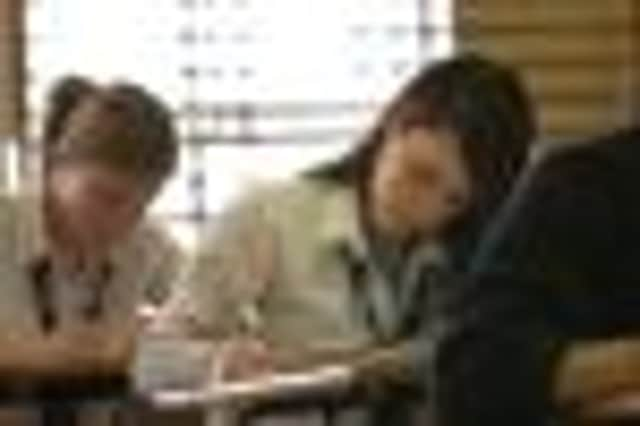Fears over reliability of Higher maths exam marking


The Higher maths principal assessor, who had worked for the Scottish Qualifications Authority as a marker since 1989, had his contract terminated by the government agency late last year following a dispute over the lowering of the pass mark of the exam paper last summer.
His departure was followed by five senior colleagues – a senior examiner and four exam setters – all leaving in protest at the way the assessor had been treated.
Advertisement
Hide AdAdvertisement
Hide AdTheir resignations have led to concerns that the replacements overseeing the marking of the exam lack the necessary experience, which could have an impact on pupils sitting the exam this summer.
But the SQA also faces claims that the politically sensitive pass mark for last year’s maths Higher was lowered by officials within the SQA to prevent an overall fall across the country.
Higher maths is described as the “gold standard” of Scotland’s exam system, with more than 20,500 pupils sitting the paper last year. Under Scotland’s exam system, the principal assessor leads a team of “appointees”, usually teachers or retired teachers, who are responsible for setting the questions.
Both the former principal assessor and former senior examiner – who do not wish to be named – claim that officials within the SQA lowered the pass rate for last year’s exam, against the wishes of markers. Examiners had called for the pass mark to be 63 out of 130, which would have led to a 0.2 per cent fall in the overall pass rate across Scotland. Instead, SQA officials set the pass rate at 62, leading to an increase in the percentage of those passing.
The former principal assessor said: “In our view the paper was set right and we have a lot of experience in getting it right. Pass rates should go up and down, not always upwards as they have been doing in recent years. That’s one of the reasons the team walked away.”
The former assessor and senior examiner now claim that with the departure of the six senior staff, the marking of this year’s exam could be affected.
The former senior examiner, who left after three years in post and more than 20 as a setter, said he wrote to Education Secretary Michael Russell in November warning of a “catastrophe” due to the exam body’s decision to proceed with the finalisation of the 2013 exam despite none of the team responsible for its setting still being in post.
“I would urge you to become actively involved in this very serious matter as far as the young folks currently preparing themselves for Higher mathematics 2013 are concerned,” he wrote. He said he was yet to receive a response from the minister.
Advertisement
Hide AdAdvertisement
Hide AdThe former principal assessor – who had his contract terminated after refusing to attend a meeting with managers – said he also had fears that a lack of experience among markers would lead to inconsistencies in the grades awarded to pupils.
“We knew how the papers operated, how to structure them to get the best out of the candidates,” he said. “That’s experience you don’t get overnight. The people who have taken over have no experience in setting whatsoever. You need consistency in marking and what you are looking for in a candidate.
“In 2012, I can say hand on heart that if you got an A from one marker, you would get that A from another – my concern is that consistency is not there now.”
Both alleged the SQA had taken shortcuts in appointing replacements, including giving a marking post to a newly qualified teacher and asking a setter for the Advanced Higher to become principal assessor for Higher at the same time.
Labour’s education spokesman Hugh Henry said: “It would appear the SQA are prepared to gamble with the future of pupils who will be sitting Higher maths. They have lost years of accumulated experience and knowledge and I worry that employers and universities might not have confidence in this year’s Higher maths because of the shortcuts it would appear the SQA are ready to take. This is extremely serious and Mike Russell needs to get to the bottom of this, to restore the confidence and credibility of the exam.”
Dr Gill Stewart, SQA’s director of qualifications development, said: “The SQA is very satisfied that it has a strong team of experienced appointees in place for Higher mathematics for 2013 that will oversee the marking and the quality assurance of that marking to maintain standards. Their work is overseen by an experienced member of SQA staff with expertise in mathematics, assessment and quality assurance.”
She added: “In 2012, the grade boundaries for Higher maths were adjusted to reflect a few questions at the end of paper 2 that proved to be more demanding than expected. This decision was made on the basis of clear statistical evidence. In addition, SQA received similar feedback about the exam from around 800 candidates and 80 teachers.
“SQA is satisfied that the grade boundaries for Higher maths were set appropriately to ensure that a candidate who would have achieved a C grade in 2011 would also get the same grade if they had sat the 2012 exam. This ensures that we are fair to candidates from one year to the next and that standards are maintained from year to year.”
Last August, the SQA said pass rates at Standard Grade, Higher and Advanced Higher had all reached their best-ever levels.